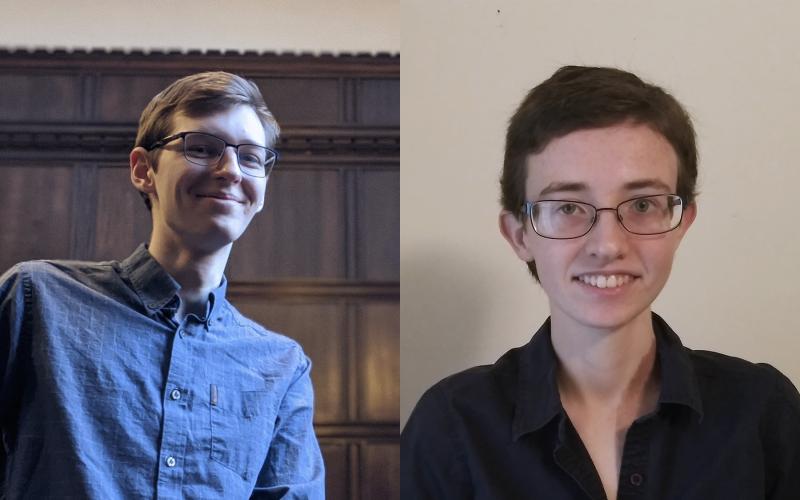
University of Pennsylvania '21 Adam Konkol and December '20 graduate Abigail Timmel have each been awarded a Churchill Scholarship for a year of graduate research study at the University of Cambridge in England.
Konkol, from Union Beach, New Jersey, and Timmel, from Baltimore, are among only 16 nationwide selected as 2021 Churchill Scholars and will receive full funding for a one-year master’s degree at Churchill College at Cambridge.
The scholarship is considered one of the most prestigious and competitive international fellowships available to American students planning graduate study in the United Kingdom. Churchill Scholars are chosen from select universities nationwide in the disciplines of science, mathematics, and engineering.
Penn has had 12 Churchill Scholars since the program’s inception in 1963, five in the last five years. This is the first year Penn has had two affiliates receive the award in the same year.
Konkol is majoring in physics, biophysics, biochemistry, and mathematics and is submatriculating for a master’s degree in physics in the School of Arts & Sciences. At Cambridge, Konkol will pursue a master’s degree in applied mathematics and theoretical physics.
Interested in the shapes and structures of living matter, Konkol has studied physical and life sciences through the Vagelos Molecular Life Sciences program. He has studied proteins involved in plant flowering with Doris Wagner, the Robert I. Williams Term Professor of Biology, and biological network structure with Eleni Katifori, associate professor of physics. He led a collaboration with John Shaw, assistant professor of geology at the University of Arkansas, to extend a model for blood vessels to explain the loops found in river deltas.
Konkol received the Vagelos Challenge Award as a sophomore and the Goldwater Scholarship as a junior and is a recipient of the Seltzer Family Digital Media Award. Konkol has been a teaching assistant for physics labs and courses for six semesters and leads weekend workshops in organic chemistry. He is a speech coach for the University Scholars research program through the Communication Within the Curriculum program. He is also a College Peer Advisor and a Research Peer Advisor. Beyond Penn, Konkol has planned and taught his own high school course at the Science Leadership Academy in Philadelphia since 2019, continuing to work with a new class online.
After graduation, Konkol plans to pursue a Ph.D. in physics or applied mathematics.
Timmel graduated in December with a bachelor’s and a master’s degree in physics. During the spring semester, she is continuing at Penn as a technical assistant in the laboratory of Eugene Mele, the Christopher H. Browne Distinguished Professor of Physics. At Cambridge, Timmel will pursue a master’s degree in physics.
She transferred to Penn from Northeastern University as a junior, after completing a semester-long co-op at Los Alamos National Laboratory in computational plasma physics. Since the summer of 2019, Timmel has been conducting theoretical condensed matter research with Mele, developing a theory for electronic phenomena in one-dimensional moiré heterostructures. She has two published papers, including one as first author with Mele.
Timmel served on the board of Women in Physics at Penn for two years. Outside of physics, she practices English change ringing—the art of ringing a set of tuned bells—and has volunteered with the Philadelphia Guild of Change Ringers.
After graduation, she plans to pursue a Ph.D. in physics.
Konkol and Timmel applied for the Churchill Scholarship with assistance from Penn’s Center for Undergraduate Research and Fellowships.
Related Articles
Two Penn students awarded a 2024 Paul & Daisy Soros Fellowship for New Americans
04/17/2024
Min Jae Kim is pursuing an M.D./Ph.D. in the Perelman School of Medicine, and Zijian (William) Niu is a fourth-year in the College of Arts and Sciences.
Penn team of four undergrads awarded the Davis Projects for Peace grant
04/15/2024
The College of Arts and Sciences students lead a community health care project in Philadelphia.
Mysteries to Personal Growth: My Journey with PURM
04/15/2024
Jasjeev Singh ('26), a Physics major, researched dark matter theories under the mentorship of Dr. Robyn Sanderson (Department of Physics and Astronomy). This research was supported by the Penn Undergraduate Research Mentoring Program.